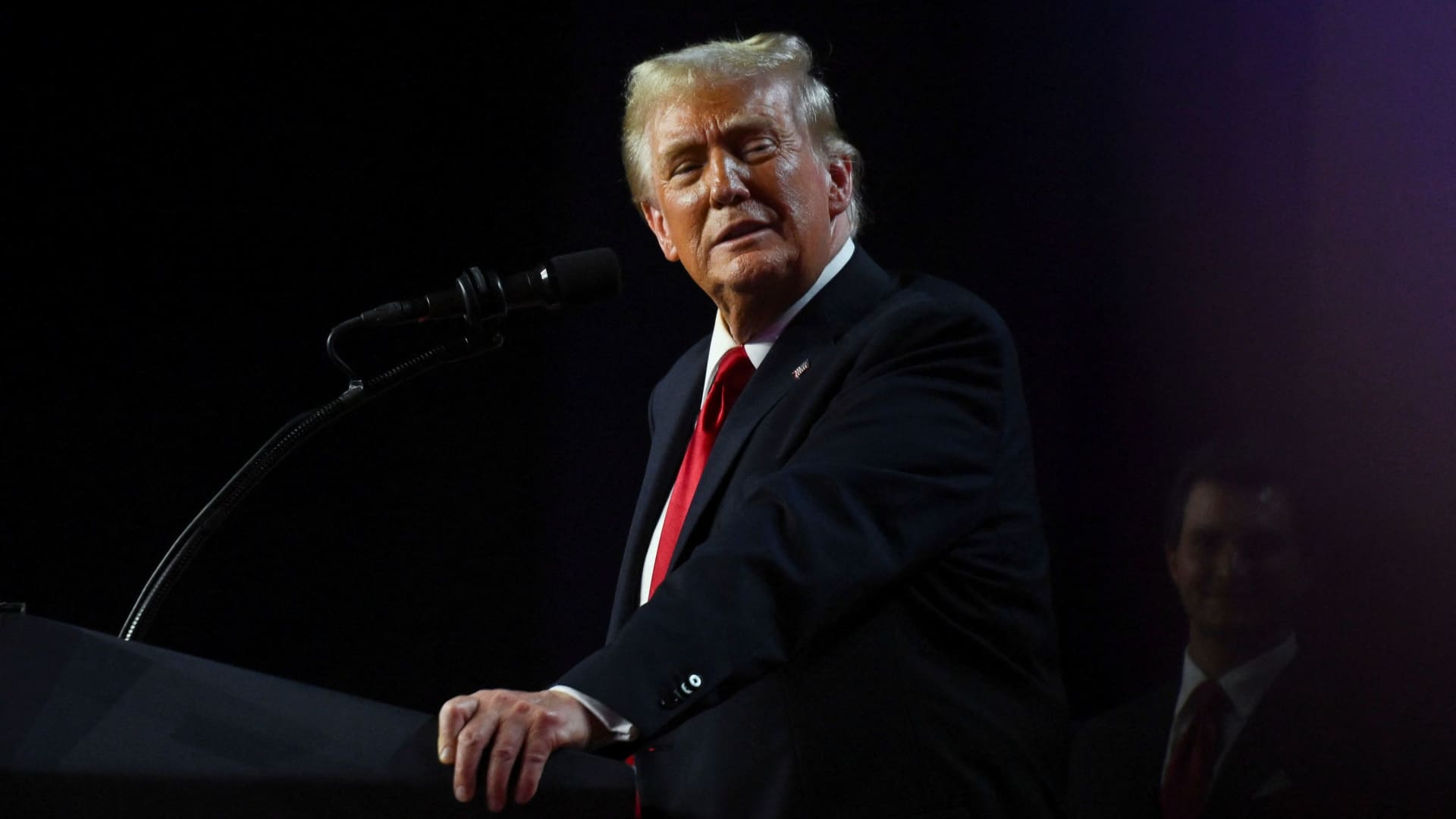Republican presidential nominee and former U.S. President Donald Trump takes the stage following early results from the 2024 U.S. presidential election in Palm Beach County Convention Center, in West Palm Beach, Florida, U.S., November 6, 2024.Â
Callaghan O’hare | Reuters
President-elect Donald Trump’s 2024 presidential campaign was stalked by the persistent threat that if he lost, he would have to fight off a raft of criminal charges in state and federal courts.
With his comeback victory over Vice President Kamala Harris in the books, Trump can rest easy. Once in office, he will likely be able to significantly delay or end all of the criminal proceedings that have been lodged against him.
But he has not yet escaped from liability in a handful of high-profile civil cases, where he has been ordered to pay combined penalties of over $570 million.
“In theory, there should be no effect” from Trump’s election on those civil matters, former federal prosecutor Neama Rahmani told CNBC.
“It’s well established that while a sitting president can’t be prosecuted, he can face civil cases,” Rahmani said.
Trump has said he plans to quickly fire his own Department of Justice prosecutor, special counsel Jack Smith, who has spent the last two years mounting serious criminal cases against the former president in two federal courts.
Both of those cases had already been tripped up by prior court rulings. Smith’s Washington, D.C., case charging Trump with illegally trying to overturn the 2020 election was effectively narrowed and delayed by a Supreme Court ruling that granted ex-presidents presumptive immunity for their official acts in office.
Smith is currently working to revive his other case charging Trump with mishandling classified documents and obstruction, after it was dismissed in July by Florida federal Judge Aileen Cannon.
Those cases are now all but guaranteed to be scrapped entirely, either under pressure from Trump’s legal team or by Smith’s team voluntarily closing up shop.
“Now that Trump has won, his criminal problems go away,” Rahmani said.
“It’s well established that a sitting president can’t be prosecuted, so the election fraud case in D.C. District Court will be dismissed, and the DOJ will abandon its Eleventh Circuit appeal of the dismissal of the classified documents case,” he said.
A state-level criminal case in Georgia, alleging Trump illegally meddled in that state’s 2020 election, is also on ice. That case has already been put on hold as Trump seeks to disqualify Fulton County District Attorney Fani Willis due to a romantic relationship she had with a lead prosecutor.
Whether or not Willis is allowed to stay on, her case may be postponed for the next four years, in accordance with longstanding federal guidelines that sitting presidents are immune from prosecution.
Only one of the four criminal cases Trump was charged with went to trial before the election: the New York case centered on a hush money payment to porn star Stormy Daniels prior to the 2016 election.
That case ended in late May with a jury finding Trump guilty on 34 felony counts of falsifying business records.
It made Trump the first U.S. president, current or former, ever to be convicted of crimes. His sentencing date, initially scheduled for mid-July, was repeatedly postponed and is now set for Nov. 26.
Judge Juan Merchan could impose a jail sentence on Trump, but many legal experts have expressed doubt that he would do so. And the judge, whose prior decisions to delay Trump’s sentencing were partly based on his consideration of the case’s unique circumstances, may be reluctant to mete out a punishment on the president-elect.
Trump’s win makes the already remote possibility of an incarceration sentence “logistically impossible and a certainty that he won’t receive any time,” Rahmani said.
Trump’s civil cases, however, should not be affected by his election, experts said.
In February, New York Judge Arthur Engoron ordered Trump to pay more than $450 million in penalties after finding him liable for business fraud.
The case, brought by New York Attorney General Letitia James, accused Trump, his two adult sons, his company and others of falsely inflating Trump’s assets to boost his stated net worth and obtain various financial perks.
Engoron’s penalty includes millions of dollars in prejudgment interest that increases by $111,983 every day until it is paid.
Based on figures provided by the AG’s office, Trump’s liability as of Wednesday totaled nearly $483 million.
Trump has appealed Engoron’s ruling. A panel of five judges on a New York appeals court strongly questioned the validity of the AG’s case during oral arguments in September, Politico reported. The appeals court has yet to issue a ruling.
Unlike in the criminal cases, Trump’s presidential win will have no direct impact on the fraud case, said Stephen Gillers, a professor at New York University Law School.
“There is no legal basis to delay the natural progress of the case through the appellate process,” Gillers told CNBC in an email.
“Trump does not have to appear in an appellate court. The appeal will not interfere with his obligations as president-elect or as president,” he said. “Basically, it’s in the hands of the lawyers and the appellate courts now.”
He added that while the courts may accommodate his busy presidential schedule, they “will not delay the case for four years.”
Gillers took the same view on the two federal civil defamation cases that columnist E. Jean Carroll won against Trump.
The president-elect has been ordered to pay Carroll more than $88 million in defamation penalties stemming from statements he made as president after the writer alleged he had raped her in the 1990s.
After Trump was projected to win the race, Carroll wrote on X, “I tried to tell you.”
Lawyers for Trump did not immediately respond to CNBC’s requests for comment on how the election affects his legal circumstances.

